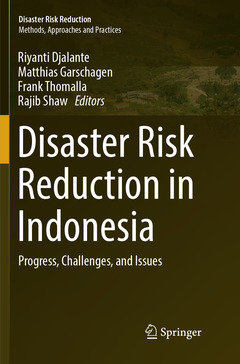Disaster Risk Reduction in Indonesia, Softcover reprint of the original 1st ed. 2017 Progress, Challenges, and Issues Disaster Risk Reduction Series
Coordonnateurs : Djalante Riyanti, Garschagen Matthias, Thomalla Frank, Shaw Rajib

Chapter 1. Introduction (Riyanti Djalante).- Part 1. Disaster Risk Governance from National to Local Level and its Integration into Development Sectors.- Chapter 2. A Review of Disaster Trends and Disaster Risk Governance in Indonesia: 1900-2015 (Riyanti Djalante).- Chapter 3. Toward Integrated and Inclusive Disaster Risk Reduction in Indonesia: Review of Regulatory Frameworks and Institutional Networks (Andri NR Mardiah).- Chapter 4. Disaster Risk Reduction in Post-Decentralization Indonesia: Institutional Arrangements and Changes (Ashok Das).- Chapter 5. Disaster Risk Reduction Capacity and Capability of Local Government in Indonesia (M.C. Daly).- Chapter 6. Examination of Legal and Institutional Frameworks for Land and Forest Fires Management: from national to community level (Nurhidayah Laely).- Chapter 7. Disaster Education and School Safety Governance after the 2004 Indian Ocean Tsunami in Indonesia: from national policy to local implementation (Mizan Bustanul).- Chapter 8. Mainstreaming Disaster Risk Reduction (DRR) and Climate Change Adaptation in the School Curriculum in Indonesia (Nurmalahayati).- Chapter 9. Spatial Planning, DRR and CCA integration in Indonesia: Progress, Challenges and Approach (Nurrohman Wijaya).- Part 2. Roles of Different Actors for DRR.- Chapter 10. The Role And Capacity of Local Government in Maintaining Post-Disaster Road Reconstruction Assets (Ezri Hayat).- Chapter 11. The Role of Manufacturing Firms As Stakeholders For Adaptation To Flood: Towards Integrative Adaptive Regional Development in Jakarta (Thomas Neise).- Chapter 12. The Role of Media in Representing Disaster in Indonesia: Between God, Nature and Human Representation (Muzayin Nazaruddin).- Chapter 13. The Role and Capacity of Disabled People’s Organisations as Policy Advocates for Disability Inclusive DRR in Indonesia (Michelle Villeneuve).- Chapter 14. The Role of The Panglima Laot Customary Institution in The 2004 Indian Ocean Tsunami Recovery in Aceh (Michael Boyland).- Chapter 15. The Role of Faith-Based Organizations As Risk Communicators: Case Study Of Bandung, West Java (Farah Mulyasari).- Chapter 16. The Role of A Women’s Collective In Rebuilding Livelihoods After a Disaster: Case Study Of Salam Village, Yogyakarta (Karen E McNamara).- Chapter 17. Science Communication for Disaster Risk Reduction: Role of LIPI through COMPRESS Program (Irina Rafliana).- Part 3. Emerging Issues in DRR Research and Practice.- Chapter 18. Ecosystem-based DRR in Indonesia: Unfolding Challenges and Opportunities (Annisa Triyanti).- Chapter 19. Culture and Community Resilience to flood: Case Study of Urban Coastal Community in Jakarta (Gusti Ayu Ketut Surtiari).- Chapter 20. Religious interpretations and psychological recovery from the Aceh 2004 tsunami: The Promise of Heaven, Healing the Trauma (Maila Dinia Husni Rahiem).- Part 4. Measuring Hazards, Risks and Community Resilience.- Chapter 21. Analysis of Flood Risk In Polder Systems In Jakarta: Present And Future (Yus Budiyono).- Chapter 22. Modeling Forest and Land Fires Risk Level: Case Study of Kapuas District, Central Kalimantan (Achmad Siddik Thoha).- Chapter 23. Tsunami Resilient Preparedness Indicators: The Effects of Integrating Religious Teaching and Roles of Religious Leaders (Wignyo Adiyoso).- Chapter 24. Social Capital and Disaster Preparedness in Indonesia: A Quantitative Assessment Through Binary Logistic Regression (Mohammad Dokhi).- Chapter 25. Measuring Community Resilience To Natural Hazard: Case Study of Yogyakarta Province (H.Z. Anwar).
Date de parution : 09-2018
Ouvrage de 639 p.
15.5x23.5 cm
Date de parution : 05-2017
Ouvrage de 639 p.
15.5x23.5 cm
Disponible chez l'éditeur (délai d'approvisionnement : 15 jours).
Prix indicatif 189,89 €
Ajouter au panier